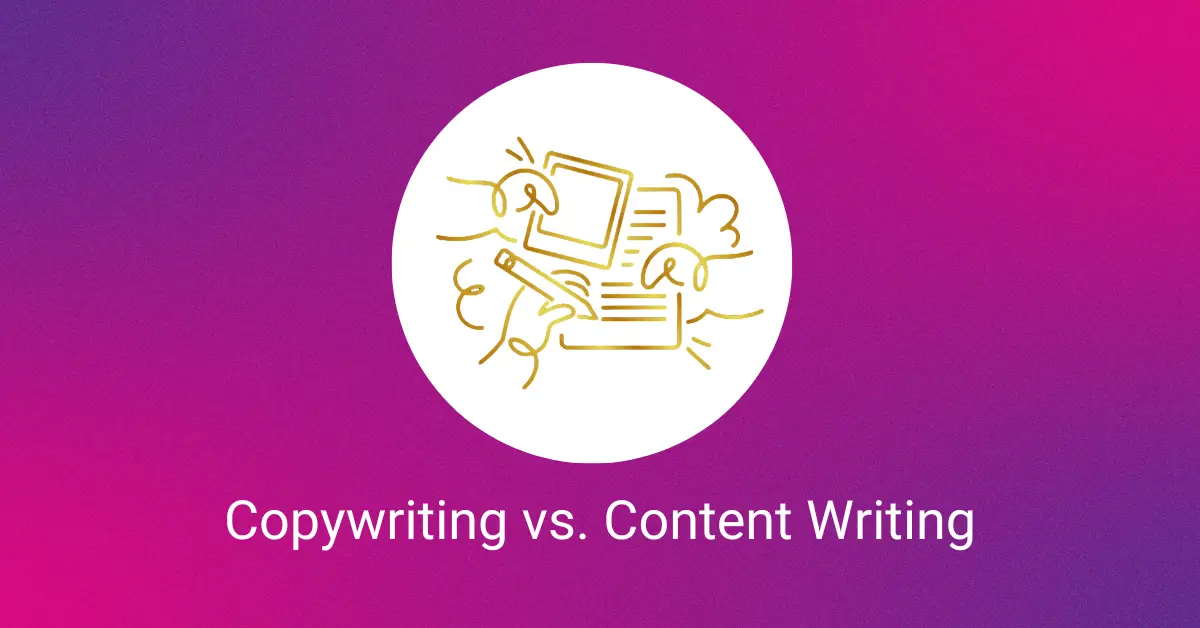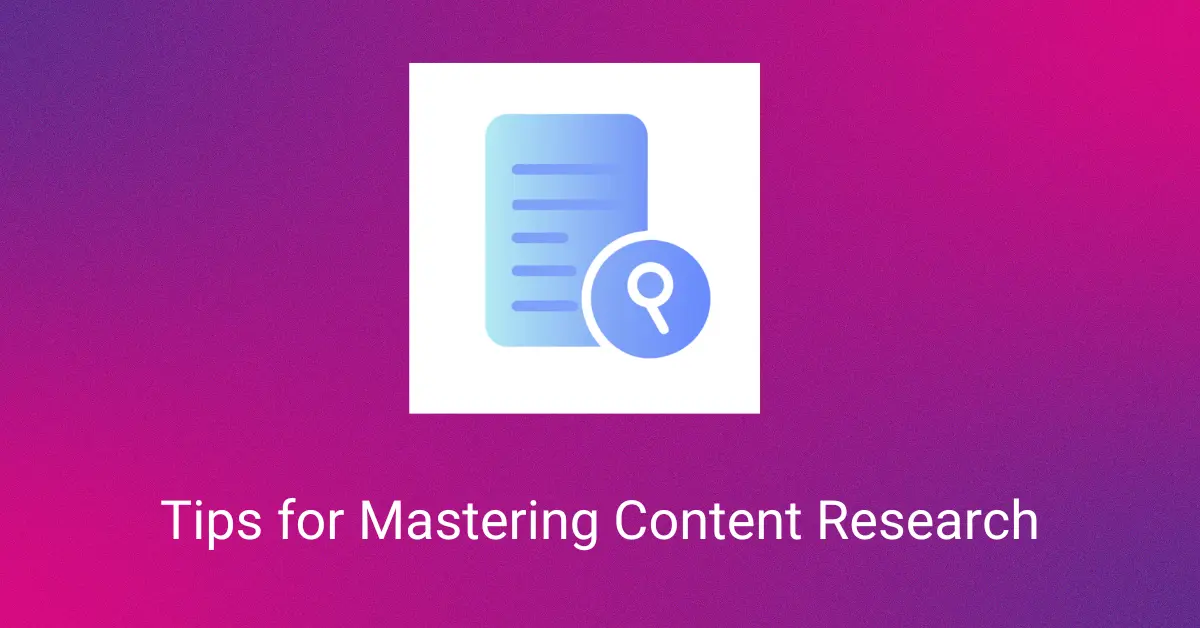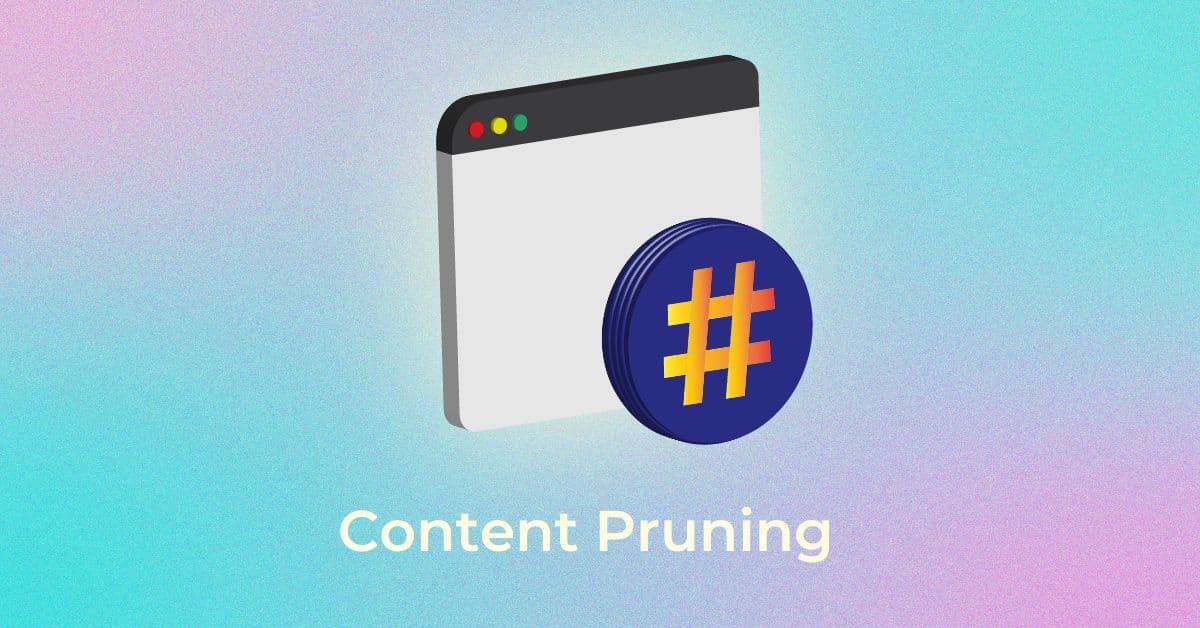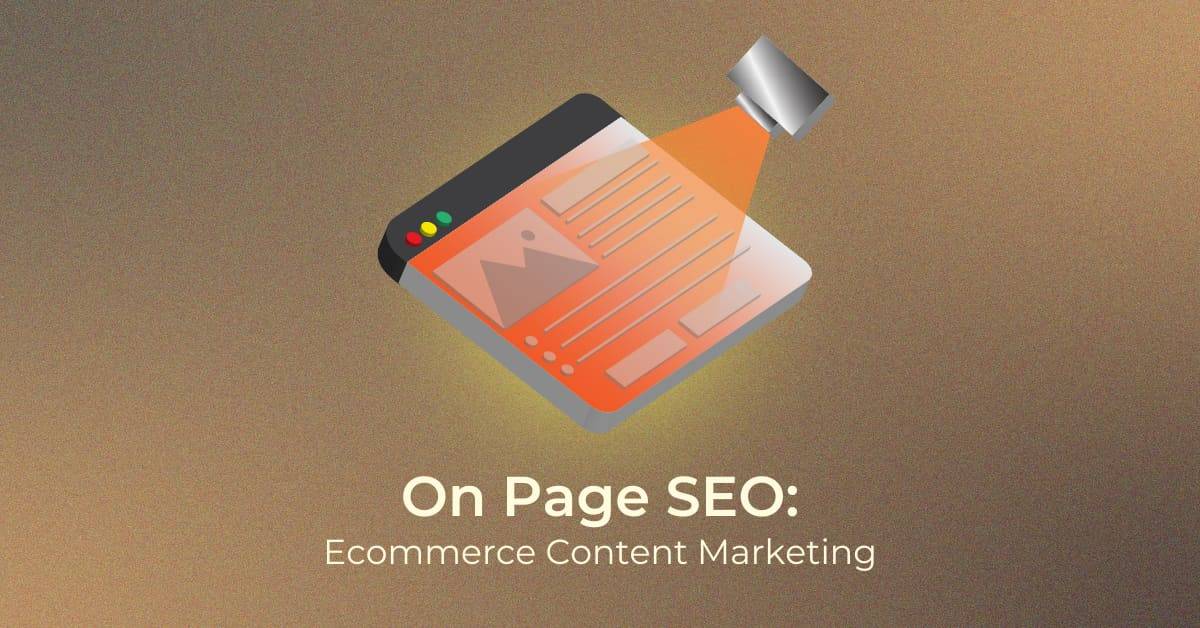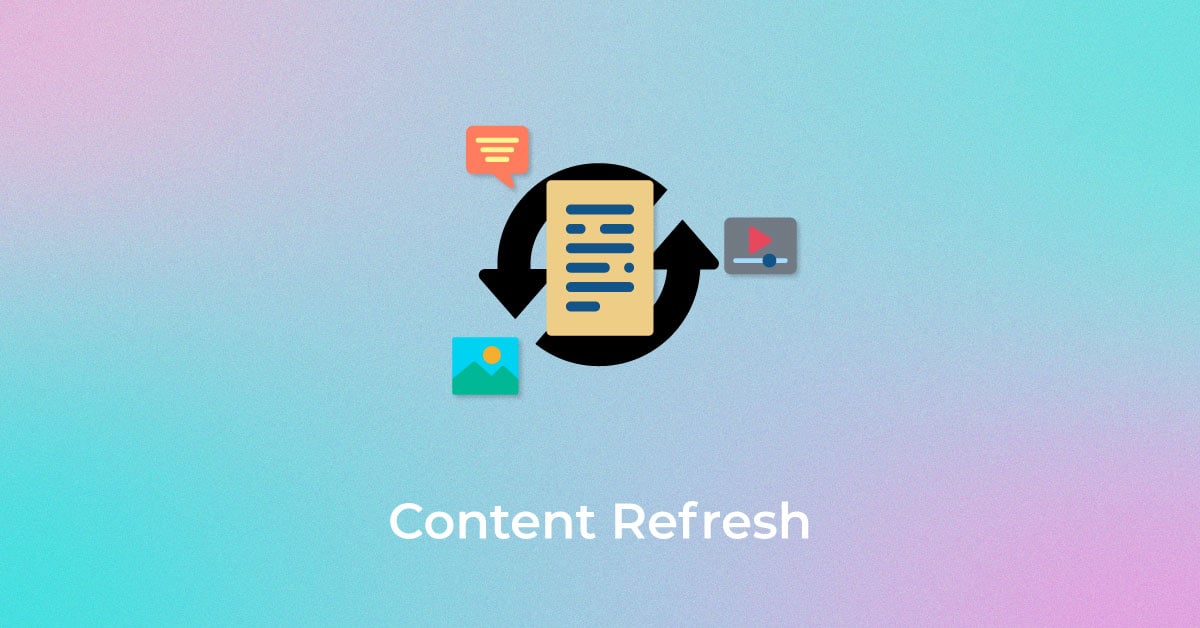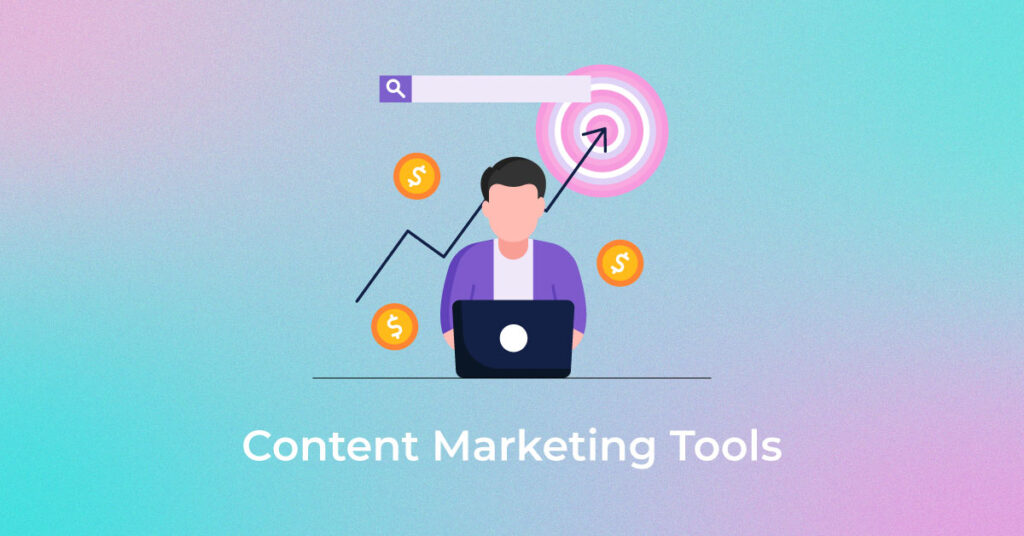What are Content Marketing Tools?
Content marketing tools help marketers enhance every stage of the content lifecycle—from ideation to creation, distribution, and analytics. They encompass a broad array of software solutions designed to streamline the work of a content team, ensuring content reaches its intended audience with maximum efficiency and impact.
Whether teams need help brainstorming topics, optimizing SEO, designing stunning visuals, managing social media schedules, or parsing through performance data, content marketing tools are the allies that arm them with the capabilities to execute their tasks with precision.
By incorporating these tools into their content strategy, marketers can ensure they are utilizing the latest technologies to remain competitive. With the help of content marketing services, they can analyze the success of their campaigns in real-time and constantly iterate on their strategies for better results
Importance of Content Marketing Tools
Content marketing tools play a vital role by saving time and resources through automation, allowing creators to focus on high-quality content. They streamline productivity through project management, task delegation, and calendar organization. Data-driven insights from these tools help marketers track performance, identifying content that resonates or needs adjustment.
In today’s crowded digital space, competitor analysis plays a pivotal role in identifying gaps and trends. These tools also reveal opportunities for unique, standout content that engages audiences. Personalization features support stronger customer connections by tailoring messages to different audience segments, fostering loyalty, and encouraging conversions. Ultimately, using these tools, along with insights from competitor analysis, empowers businesses to grow strategically, expand their online presence, and maintain a competitive edge in a fast-evolving landscape.
Top 12 Content Marketing Tools for 2025
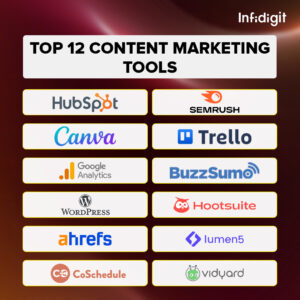
1. HubSpot
HubSpot stands out as a comprehensive content marketing platform that aligns sales, marketing, and customer service efforts. Its CRM functionality serves as the backbone, allowing you to maintain intricate details about customer interactions, ensuring personalized marketing outreach.
Two sentences about why it made the best list: HubSpot provides an integrated suite for managing various aspects of content marketing, from creation to customer relationship management. It stands out for its robust analytics, automation features, and free CRM that centralizes operations.
Five benefits:
- Streamlined workflow across different marketing channels
- Personalized engagement through detailed customer insights
- Efficient lead capture and nurturing
- Comprehensive performance insights for informed decision-making
- Scalability to suit businesses of all sizes
Best for: HubSpot is ideal for medium to large enterprises looking to centralize their marketing efforts and seeking deep analytics to inform strategy as well as small businesses eager to grow their online presence with a comprehensive suite of marketing tools.
2. SEMrush
SEMrush has carved a niche as an indispensable content marketing tool primarily for its extensive SEO and content analytics capabilities. Their platform goes beyond providing data by offering insights and action points for improving your search engine rankings and content strategy holistically.
Two sentences about why it made the best list: SEMrush is renowned for its in-depth analysis of SEO and competitor data, allowing marketers to craft data-driven content strategies. With its multifaceted approach to tracking and enhancing online visibility, it is a favorite among both SEO professionals and content marketers.
Five benefits:
- Identifies lucrative keywords and provides content optimization suggestions
- Uncovers competitors’ content and SEO strategies
- Monitors brand mentions across the web for reputation management
- Offers actionable insights to improve website health and search performance
- Delivers traffic analysis to appraise potential market penetration and performance
Best for: SEMrush is best for content marketers and SEO professionals who demand a robust, detailed analysis of competitive intelligence, site performance, and keyword research to comprehensively optimize their content and SEO initiatives. As a comprehensive SEO tool, SEMrush offers invaluable insights that drive successful optimization strategies.
3. Canva
Canva is highly regarded for its ability to empower individuals and teams to create professional-quality graphics without the need for advanced design skills. It’s a go-to tool for crafting compelling visuals across all content marketing channels, from social media posts to detailed infographics.
Two sentences about why it made the best list: Canva democratizes design with its user-friendly interface and a plethora of ready-to-use templates and elements that streamline the creative process. It has become a staple for content developers seeking to quickly produce eye-catching visuals that enhance their storytelling.
Five benefits:
- Lowers the barrier to entry for high-quality graphic design
- Saves time with templates and simple customization options
- Encourages cohesive brand messaging through brand asset storage
- Enhances collaboration with easy-to-use sharing features
- Integrates with other tools and platforms to ease workflow
Best for: Canva is ideal for content marketers, social media managers, and businesses of any size looking to produce stunning graphics and branded content quickly, without needing in-house design expertise or a hefty budget.
4. Trello
Trello offers an engaging and flexible approach to content management and project tracking with its card and board system. It’s a preferred tool for teams looking for a blend of simplicity and effectiveness in managing their content marketing workflows.
Two sentences about why it made the best list: Trello excels at streamlining project management with its intuitive visual boards that can be customized to fit any content marketing process. Its adaptability and integration capabilities with various apps make it an excellent choice for teams seeking a centralized hub for their collaborative efforts.
Five benefits:
- Simplifies project tracking and enhances team transparency
- Promotes a fun and interactive way to manage content marketing tasks
- Serves as a single source of truth for project-related documentation and communication
- Customizable workflows to suit the unique processes of different teams
- Scalability from small projects to complex enterprise-level campaign management
Best for: Trello is tailored for content marketing teams and project managers who want a visually oriented and straightforward tool to track progress across multiple projects, enhance team collaboration, and streamline project workflows.
5. Google Analytics
Google Analytics garners acclaim for being one of the most powerful content marketing tools available, offering an in-depth look at user behavior and site performance. This free-to-use tool allows marketers to analyze critical metrics that showcase the success and areas of opportunity within their content strategies.
Two sentences about why it made the best list: Google Analytics earns its spot as a top SEO reporting tool for its ability to track user interactions and measure content engagement across digital platforms. With real-time data tracking and comprehensive reporting, it delivers invaluable insights that empower content marketers to make data-driven, strategic decisions.
Five benefits:
- Enables informed decisions based on user interaction data
- Helps understand content performance and visitor engagement depth
- Identifies traffic sources to optimize campaigns for better reach
- Tracks conversions to determine ROI and impact of content on goals
- Free of charge, offering robust analytics to any size business
Best for: Google Analytics is best suited for data-driven content marketers, SEO specialists, and businesses of all sizes seeking a no-cost, high-power analytics solution to comprehensively evaluate and refine their content strategy.
6. BuzzSumo
BuzzSumo is particularly noteworthy among content marketing tools for its ability to pinpoint what content is most influential within a particular niche or what a competitor’s most shared blogs are. This tool specializes in discovering trends, monitoring content success, and identifying key influencers, making it an essential part of a marketer’s toolkit.
Two sentences about why it made the best list: BuzzSumo has made a mark as a multi-faceted content analysis tool, enabling marketers to unearth high-performing content and influential individuals in any industry. It simplifies influencer marketing and content ideation, invaluable for those pressed for time and seeking data-driven insights.
Five benefits:
- Enhances content strategy with performance-based insights
- Streamlines influencer outreach and marketing efforts
- Keeps marketers abreast of viral trends and topics
- Provides competitor benchmarks for informed content creation
- Alerts ensure immediate updates on content interactions and opportunities
Best for: BuzzSumo is perfect for content strategists, social media managers, and marketers who prioritize staying on the cutting edge of trends and want to connect with influencers to amplify their brand’s reach.
7. WordPress
WordPress is recognized as one of the most widely used content management systems globally and is particularly favored for its flexibility and ease of use. Whether you’re running a personal blog, a business website, or a large online magazine, WordPress provides the necessary tools to create, manage, and scale your web content effectively.
Two sentences about why it made the best list: WordPress’s unparalleled ubiquity and comprehensive feature set make it an obvious choice for any list of top content marketing tools. It offers users an intuitive platform that can be both a straightforward blogging tool and a complex website builder, catering to a wide range of needs.
Five benefits:
- Eases the content publishing process with a streamlined editor
- Adaptable to different types of web content, from text to multimedia
- Enhances website discoverability with in-built and add-on SEO tools
- Wide-ranging design options without the need for advanced coding
- Scalable as your content marketing needs grow and change
Best for: WordPress is best for content creators seeking a versatile, scalable, and user-friendly platform to publish their work, whether they’re just starting out or looking to manage a complex, multi-contributor site.
8. Hootsuite
Hootsuite is a stalwart in the realm of social media content management, offering a comprehensive dashboard that lets businesses orchestrate their social media activities across numerous platforms. It provides valuable social listening features and analytics, helping you stay tuned to your audience’s needs while efficiently managing your online presence.
Two sentences about why it made the best list: Hootsuite’s ability to consolidate social media management in one platform is a significant time-saver and stress-reducer for marketers. By providing tools for scheduling posts, analyzing social traffic, and engaging with audiences, it solidifies its position as a vital asset for content marketing.
Five benefits:
- Centralizes social media tasks, enhancing efficiency
- Helps in identifying and capitalizing on social trends
- Encourages proactive community management and customer service
- Offers data to refine social media strategy for maximum impact
- Facilitates smooth team collaboration with assigned tasks and approvals
Best for: Hootsuite is ideal for small to large businesses that manage multiple social media accounts and require a platform that can handle comprehensive scheduling, analytics, and team collaboration.
9. Ahrefs
Ahrefs is a robust SEO tool widely regarded for its capabilities in keyword research, competitor analysis, and backlink tracking. Content marketers rely on Ahrefs for its deep data-driven insights that guide them in optimizing their content for better search engine rankings, understanding their competitors’ strategies, and uncovering potential gaps in their own content landscape.
Two sentences about why it made the best list: Ahrefs is a top choice for its extensive database of backlinks, keywords, and ranking profiles, providing unparalleled insight into the mechanics of search engine performance. The tool’s commitment to delivering actionable SEO data helps content marketers to pinpoint precise improvements and opportunities for content optimization.
Five benefits:
- Helps construct a comprehensive keyword strategy for content
- Unveils competitors’ content strategies to inform your own planning
- Assists in tracking content performance and its impact on SEO
- Empowers you to discover backlink opportunities for improving domain authority
- Facilitates content audit endeavours to refresh or retire outdated content
Best for: Ahrefs is best suited for SEO professionals, content marketers, and digital marketing agencies intent on achieving a deep understanding of the SEO landscape and eager to apply this knowledge to advance their content marketing goals.
10. Lumen5
Lumen5 is celebrated for transforming the way marketers approach AI content creation and video production. Using AI, this tool elevates blog posts into engaging videos, making it easier than ever to repurpose written content into dynamic visual formats. With its detailed editing tools and a built-in media library, Lumen5 stands as a valuable asset for any content creator looking to diversify their content offerings with video.
Two sentences about why it made the best list: Lumen5 streamlines the video creation process by allowing users to convert text-heavy content into compelling, shareable videos. Its user-friendly interface and access to thousands of stock images and music tracks empower creators irrespective of their video editing experience.
Five benefits:
- Reduces the time and effort required to produce quality video content
- Enables easy content repurposing, extending the life and reach of your posts
- Facilitates creation of high-engagement content without a steep learning curve
- Helps maintain brand consistency across video campaigns
- Optimizes videos for social media, maximizing user engagement
Best for: Lumen5 is best for content marketing teams and solo marketers looking to tap into video marketing’s potential with an easy-to-use platform that doesn’t compromise on the quality of content.
11. CoSchedule
CoSchedule is a multifaceted content marketing platform acclaimed for its organizational prowess and marketing automation capabilities. It provides teams with an intuitive editorial calendar, social media scheduling tools, and comprehensive integrations to streamline the content creation and promotion process.
Two sentences about why it made the best list: CoSchedule has earned its spot on the best list for its all-in-one approach to managing content marketing workflows and social media campaigns. Its collaborative features and ReQueue technology automate the resharing of top-performing content, boosting efficiency and consistency.
Five benefits:
- Centralizes your planning, allowing for a clear overview of your marketing activities
- Saves time on social media by automating post scheduling and reposts
- Enhances team collaboration and accountability with task tracking
- Informs strategy with performance data and actionable insights
- Streamlines processes with seamless integrations to other marketing tools
Best for: CoSchedule is ideal for content marketers looking for a comprehensive tool to boost productivity, coordinate team efforts, and automate social media publishing as part of an integrated marketing strategy.
12. Vidyard
Vidyard distinguishes itself as a dynamic video hosting and analytics platform, tailored for content marketers who want to leverage video’s robust potential within their content strategies. By enabling the creation, sharing, and tracking of video content, Vidyard provides actionable insights to optimize video performance and viewer engagement.
Two sentences about why it made the best list: Vidyard’s significant appeal lies in its integration capabilities and interactive playback features that allow for embedded calls-to-action and in-video forms, boosting lead generation and user engagement. With robust analytics and SEO optimization, it empowers marketers to measure the impact of their video content vigorously.
Five benefits:
- Simplifies video content creation for diverse marketing needs
- Enhances lead generation and conversion rates with interactive features
- Delivers detailed analytics to tailor and improve video marketing strategies
- Supports alignment across sales and marketing with CRM integrations
- Increases SEO value of video content for better online visibility
Best for: Vidyard is an excellent choice for sales teams and content marketers keen on using video to its fullest extent by integrating it effectively into their email, web, and social content strategies.
Tips for Maximizing the Benefits of Content Marketing Platforms
1. Develop a Comprehensive Content Strategy
Developing a comprehensive content strategy is the fundamental step to maximizing the potential of content marketing platforms. Start by defining clear goals, understanding your audience, and identifying the key performance indicators (KPIs) that will measure your success. A thought-out plan allows you to create a consistent content calendar, focus your efforts on the most profitable channels, and allocate resources effectively. By aligning your content with your brand’s values and objectives, you pave the way for a cohesive narrative across all marketing efforts, ensuring that every piece of content serves a strategic purpose and builds towards larger marketing goals.
Strategize on the types of content that will resonate with your audience, whether that’s blog posts, videos, infographics, or social media content. Assemble a mix of evergreen pieces that sustain long-term traffic and timely posts that capitalize on current trends. A well-structured strategy underpins every successful content marketing campaign and harnesses the full power of the tools at your disposal.
2. Foster Team Collaboration
Fostering team collaboration within content marketing platforms not only enhances the creative process but also ensures that all members are aligned with the strategy and execution. Encourage an environment where ideas are shared freely, feedback is constructive, and every team member feels responsible for the content’s success. Utilize collaboration features such as shared workspaces, commenting, and task assignments to keep everyone in the loop and working in unison.
Platforms like Slack and Trello are designed to facilitate communication and project management, making them vital for teams spread across different locations or working remotely. They make it possible to synchronize content creation and distribution efficiently, track progress, and ensure content is delivered to the right standard and on time. By creating a culture of transparency and collective responsibility, you empower your team to achieve more while fostering a spirit of camaraderie.
3. Leverage Automation Features
Leveraging automation features within content marketing platforms can vastly improve efficiency and the overall quality of your marketing efforts. Set up workflows that automatically publish content, distribute it across channels, and even repurpose content to maximize its reach and lifespan. Automation tools can also help with routine tasks such as email marketing campaigns, social media posting, and SEO optimization.
For example, use Hootsuite to schedule a queue of social media posts or employ HubSpot’s email workflows to nurture leads systematically. Implementing these features means less time spent on repetitive tasks and more on strategic planning and creative work. Additionally, automation reduces the chance of human error, providing reliability and consistency.
But remember, automation should enhance your strategy, not replace the human touch. Ensure to maintain a balance where personalization and interaction are not forfeited for the sake of automation.
4. Analyze Key Performance Metrics
Analyzing key performance metrics is crucial to understanding the impact of your content and refining your marketing strategies. Content marketing tools often come with built-in analytics that provide a wealth of data on user engagement, reach, conversion rates, and more. By regularly reviewing these metrics, you can make informed decisions on what content to produce more of, what to improve, and what to abandon.
Use platforms like Google Analytics to track page views, bounce rates, and average session lengths, or social media tools to monitor likes, shares, and comments. By setting benchmarks and tracking progress, you can quantify the success of your content and demonstrate a return on investment (ROI) to stakeholders.
Not only do these insights inform content creation, but they also guide budget allocation and campaign adjustments. In this data-driven age, neglecting these metrics means missing out on opportunities to connect with your audience effectively and grow your brand.
5. Keep Up with Industry Trends
Staying abreast of industry trends is paramount to ensure your content remains relevant and competitive. Content marketing tools with trend discovery features like BuzzSumo can help you identify popular topics, influencer insights, and emerging discussions in your industry. This knowledge fuels your brainstorming sessions and helps you produce content that resonates with your audience’s current interests and needs.
Regularly checking in on the latest content types, distribution channels, and technological advancements gives you a competitive edge. Adapt your content strategy to be agile; this will allow you to quickly leverage new trends and technologies, such as AI-powered content creation or augmented reality experiences, which could prove to be game-changers in engaging your audience.
Additionally, by attending industry webinars, reading publications, and participating in professional forums, you enrich your understanding of market shifts and consumer behavior. These activities should be a regular part of your routine to keep your content strategy not just current, but ahead of the curve.
Conclusion: Choosing the Best Content Marketing Tools for Your Strategy
In conclusion, choosing the best content marketing tools is not about picking the most popular or the most featured-packed options—it’s about finding the right fit for your unique strategy, goals, and team capabilities. By aligning your selection with well-defined objectives and taking into account factors such as budget constraints, essential features, ease of use, scalability, and customer support, you can ensure that your content marketing toolbox is both robust and effective.
Keep in mind that the digital marketing landscape is constantly evolving, and flexibility is key when selecting the right digital marketing tool for your needs. Don’t hesitate to test out different tools through free trials, listen to feedback from your team, and stay vigilant for new solutions that could enhance your current setup. Ultimately, the right blend of tools will streamline your content creation, distribution, and analysis, leading to a more impactful content marketing strategy and a stronger online presence.
With careful consideration and a strategic approach, the platforms and tools you choose today can set you up for success not just in 2025, but well into the future.
FAQs About Content Marketing Tools
1. Why are content marketing tools essential for businesses?
Content marketing tools are essential for businesses as they streamline the content creation process, help in strategizing and distributing content effectively, and provide valuable insights into audience engagement, thereby enhancing productivity and influencing better marketing decisions.
2. What features should I look for in a content marketing tool?
In a content marketing tool, look for ease of use, content creation and scheduling features, integration with other platforms, analytics for tracking performance, automation capabilities, and robust customer support to ensure comprehensive management of your content strategy.
3. What are the common challenges when using content marketing systems?
Common challenges when using content marketing systems include navigating complex interfaces, integrating tools with existing systems, scaling as business grows, and analyzing data to glean actionable insights from the information collected.
4. How can content marketing tools improve my content strategy?
Content marketing tools improve your strategy by providing data-driven insights for content optimization, automating repetitive tasks, facilitating team collaboration, and ensuring content is targeted and distributed effectively to engage your audience and achieve your marketing objectives.
5. Are there any free content marketing tools available?
Yes, there are free content marketing tools available, often with basic functionalities that can be upgraded for advanced features through paid plans, such as HubSpot’s CRM, Canva for design, or Grammarly for writing assistance.
Popular Searches
How useful was this post?
5 / 5. 1










